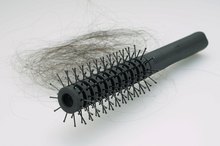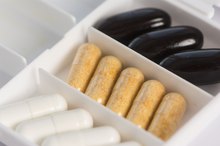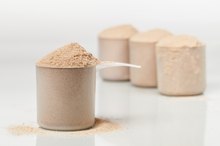Can Protein Supplements Cause Protein in the Urine?
You may take protein supplements -- in the form of bars, pre-mixed shakes or powders -- to support your efforts to increase lean muscle mass. The International Society for Sports Nutrition says that if you exercise ambitiously, you need between 0.63 and 0.9 grams of protein per pound of body weight per day, compared to the 0.36 grams per pound needed for the average person 2. Your body cannot store protein and thus uses any extra for energy or converts it to fat. Excess protein may show up as acids -- not as protein -- in your urine.
Protein Supplements
The average American gets plenty of protein through a regular diet. You might take protein supplements, however, if you are an athlete in training, recovering from an illness or are unable to get protein from regular foods. Protein supplements include:
- the milk derivatives whey protein or casein
- soy
- egg white
- hemp
- pea
- rice powders
Protein Needs
How Much Protein Per Day if Working Out?
Learn More
The Institute of Medicine deems protein intake safe at between 10 and 35 percent of your daily calorie intake. When you consume more, you likely push out other essential nutrients such as fats and carbohydrates. In addition, you could overtax the kidneys. A study in the January 2009 issue of the “Journal of the American Dietetic Association” shows that your body can only utilize about 30 grams of protein in one meal to stimulate muscle synthesis 6.
- The Institute of Medicine deems protein intake safe at between 10 and 35 percent of your daily calorie intake.
- A study in the January 2009 issue of the “Journal of the American Dietetic Association” shows that your body can only utilize about 30 grams of protein in one meal to stimulate muscle synthesis 6.
Extra Protein
If you do not eat enough calories to sustain your daily burn, extra protein will be used as energy. If you overeat calories, your body will convert protein to fat. Excess protein also causes you to lose more fluids and calcium through the urine. You may produce a greater volume of urine and more acidic urine, but not more protein in the urine.
- If you do not eat enough calories to sustain your daily burn, extra protein will be used as energy.
- If you overeat calories, your body will convert protein to fat.
Urinary Protein
What Is Normal Amount of Protein in Urine?
Learn More
Excess protein in the urine can indicate a serious medical condition, including kidney failure. Your kidneys usually retain protein because they are large molecules, but if your kidney is infected, the protein may pass through. Eating more protein can stress the kidneys by making them work harder to filter it out. If you have increased your intake of protein supplements in conjunction with increased exercise, it might be the exercise – not the protein supplements – that are causing excess protein in your urine. Talk to your doctor about other possible temporary, benign causes for increased protein in the urine including emotional stress, a recent fever or exposure to extreme temperatures.
- Excess protein in the urine can indicate a serious medical condition, including kidney failure.
- Eating more protein can stress the kidneys by making them work harder to filter it out.
Related Articles
References
- Ask the Dietitian: Protein & Amino Acids
- Journal of the International Society of Sports Nutrition: International Society of Sports Nutrition Position Stand: Protein and Exercise
- The Journal of Nutrition: Dietary Animal and Plant Protein and Human Bone Health: A Whole Foods Approach
- Orthomolecular.org: The Body’s Negative Response to Excess Dietary Protein Consumption
- Oklahoma Cooperative Extension Service: Protein and the Body
- Journal of the American Dietetic Association: A Moderate Serving of High-Quality Protein Maximally Stimulates Skeletal Muscle Protein Synthesis in Young and Elderly Subjects
- Barzel, U. & Massey, L. (1998). Excess Dietary Protein Can Adversely Affect Bone Health. The Journal Of Nutrition. Vol. 128, No. 6. Pp. 1051-1053.
- Friedman, A.N. (2004) High Protein Diets: Potential effects on the kidney in renal health and disease. American Journal Of Kidney Disease. Vol. 44, Issue 6. Pp. 950-962.
Writer Bio
Andrea Cespedes is a professionally trained chef who has focused studies in nutrition. With more than 20 years of experience in the fitness industry, she coaches cycling and running and teaches Pilates and yoga. She is an American Council on Exercise-certified personal trainer, RYT-200 and has degrees from Princeton and Columbia University.









